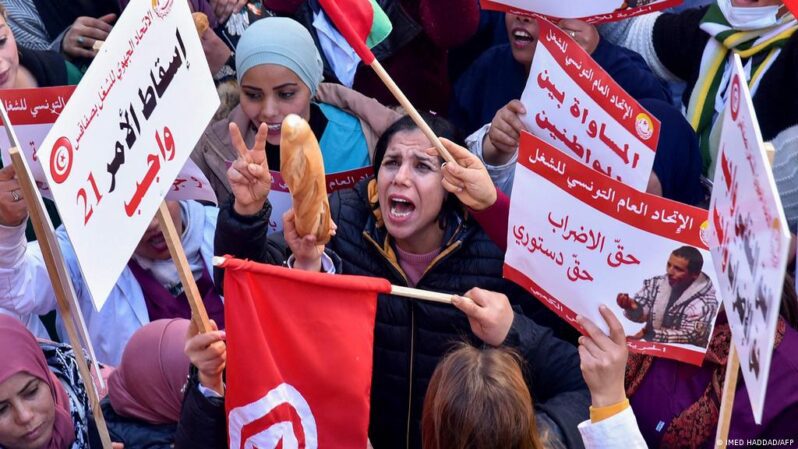Main Arab Legal Events: The Legal Agenda’s Perspective: Weekly Note noo 20 (13-20 January 2013)

Main Arab Legal Events: The Legal Agenda’s Perspective
Weekly Note noo 20 (13-20 January 2013)
A New Chapter in Relations between the “Revolution” and the Judiciary
The Court Faces New Conflicting Currents in the Case of Mohammad Mahmoud: “The Egyptian Judiciary Stands Firm, Stop Calling for its Purification”
Demonstrators Set Fire to the First Floor of the Alexandria Court as a Sign of Protest against Judges’ Withdrawal from the Protestors’ Killings Case
A Draft Law for the Purification of the Legal Profession and Judiciary in Tunisia
First Decision of the Jordanian Constitutional Court
1-Egypt
-The Criminal Court ordered a discontinuance of proceedings in the case of “Mohammad Mahmoud”, where 379 people are accused of sabotage, instigating riots and attempts to topple the regime, pursuant to a presidential pardon decree. According to the reasons for judgment, the latter was based on the pardon decree. Judges called upon the media to make that point clear in order to avoid any new calls for the purification of the Judiciary that, as the judgment shows, stands “firm and immovable”. The judgment is a new message addressed by judges as an anticipatory response to any possible reactions. On the other hand, demonstrators set fire to the Alexandria court as a sign of protest against the judges’ withdrawal from the case relevant to the killing of protestors, which opens a new chapter in the revolution’s repercussions on the relationship between citizens and the Judiciary.
-The General Prosecution members took back their decision of work suspension in an effort to preserve the higher interests of the nation and those of people subject to legal proceedings. Egypt’s Judges’ Club and the Supreme Judicial Council issued a joint statement hailing the judges’ struggle for the independence of the Judiciary, and praising their “responsible decision” to resume work. It should be noted that judges decided to get back to work despite the ongoing crisis of General Prosecutor Talaat Abdullah. The permanent Legal Committee for Defending Lawmen and General Prosecution filed a case before the Cairo Court of Appeal to force the Minister of Justice to put the General Prosecutor’s resignation back on the table and consider the position as vacant.
-The Counselor Mahmoud Makki has been appointed as Egypt’s ambassador to the Vatican, nearly a month after his resignation from his political position as a Vice-President of the Republic. He declared that his appointment as judge does not really meet the political job’s requirements. It is worth signaling that the former General Prosecutor Mahmoud Abdulmajid had refused the same position.
2- Tunisia:
-Debate resurged over the issue of the Judiciary’s purification after an official declaration according to which the Constituent Council of Tunisia started studying a draft law on the purification of both the legal profession and Judiciary. The draft law provides for the establishment of an elected committee that would carefully examine the files of judges and lawyers accused of corruption. It would also be responsible for issuing decisions against them and even be entitled to strike off lawyers and revoke judges. The National Lawyers Committee, the Syndicate of Tunisian Magistrates and the Tunisian Judges’ Association denounced the act of setting up a committee which authorities exceed the normal judicial standards. The Tunisian legal entities stated that the establishment of such a committee is nothing but a violation of the transitional justice’s principles, as long as it lacks the guarantees of a fair trial and the right of defense.
3- Jordan:
– The Supreme Constitutional Court issued its first decision after its establishment on October 2012, in a historical step towards the consecration of the latest constitutional amendments. According to the decision, the government shall not grant any new investment concessions unless such measure is undertaken by virtue of law.
Beyond the Weekly Note:
-Bahrain:
Rights activist “Yousuf Al-Mouhafaza” was released on a 100 Dinar bail, and his case was postponed till January 29, 2013. On another note, the Arab Network for Human Rights Information denounced the six days procrastinations in the execution of the legal verdict relevant to the release of the rights activist “Maasouma Al-Sayyed” on a 100 Dinar bail. The hearing will be held on February 5, 2013.
-Sudan:
On January 20, 2013, the Khartoum Criminal Court dismissed all charges against the Sudani rights activist “Jalila Coucou Khamis”, except for the charge of “publication of false news”, after 9 months of detention. The court ordered her immediate release. Jalila was facing capital punishment due to the nature of charges addressed against her by the General Prosecution, including among others, “undermining the constitutional system”, “inciting hatred among confessions” and “dealing with criminal and terrorist organizations”.
Prepared by Christelle El-Feghaly



